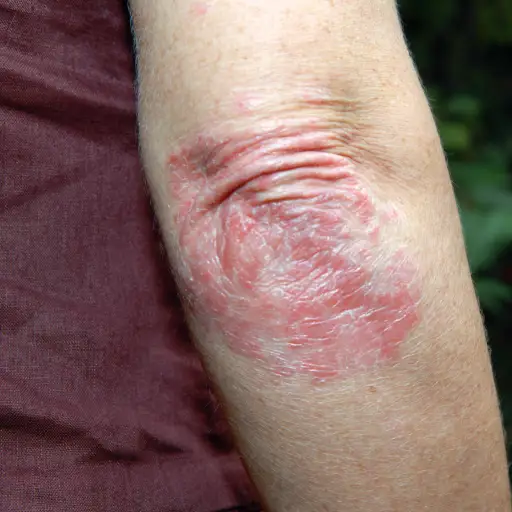Are Your PsO Meds Working as Well as They Should?
Psoriasis treatment plansare unique, often requiring a combination of topical and systemic treatments. Finding the right medication (or team of medications) can feel like pulling a needle out of a haystack, especially when the treatments seem to stop working, and swelling and inflammation persists. According to the American Academic of Dermatology Association, approximately 7.5 million people in the United States are being treated for psoriasis and for a good chunk of those folks, the treatments aren't working. These expert tips will help you tell if your meds have stopped working and what to do when you notice the signs.

First, a Primer on the Types of Treatments
Treatment for psoriasis varies greatly, depending on the affected body part, severity, and desires of the patient, says Rachel Nazarian, M.D., a dermatologist at Schweiger Dermatology Group in New York City. For example, creams and ointments are considered topical treatments, used to treat smaller surfaces of the skin. Systemic treatments, like oral medications, biologic therapies, and phototherapy, are used for larger areas and to treat internal inflammation. According to Kemunto Mokaya, M.D., a dermatologist in Houston, TX., most psoriasis treatments take weeks to kick in because the turnover cycle of the skin occurs between 28 and 40 days. Topical corticosteroids, which are strong topical steroids, may take as little as two weeks to see a response.

Give Your Meds a Boost
If your medications for psoriasis aren’t working, this may be a sign that the medications aren’t strong enough, says Joshua Zeichner, M.D., associate professor of dermatology and director of cosmetic and clinical research at Mount Sinai Hospital in New York City. But instead of ditching what you’re currently on, your doctor might recommend a layered approach. Within a specific medication, the higher the number, the higher the strength, according to Dr. Nazarian. “So a 0.5% hydrocortisone is weaker than a 1%, but you can’t compare the percentages across different medications,” she explains. But to treat more extensive disease, systemic medications can be added in addition to topical medications.

Consistency Is Key
Topical treatments and systemic medications need time to take full effect. Therefore, stopping treatment in the middle of its tracks can result in no or slow changes to your skin’s health. Failing to adhere to atreatment plancan lead to complete treatment failure, warns Dr. Mokaya. Plus, when medication is stopped abruptly because you believe your skin is healed, you can have a rebound reaction. “This is especially seen when psoriasis is treated with corticosteroids for a long time and then abruptly stopped without a taper.”
Everything in Moderation
Another reason why your medications may not work is because you may be engaging in activities that lead to more damage. For example, we know that sunlight has been touted as a form of psoriasis treatment. But we also know that too much exposure to the sun can lead to skin cancer. “We don’t recommend laying out in the sun for prolonged periods of time as a method of treatment, since you’re switching one problem (psoriasis) for another (skin cancer),” Dr. Nazarian says. Plus, too much sun can lead to inflammation, which can trigger a flare of plaques on your skin.

Check the Ingredients in Your OTC Stash
Skimming the ingredients list of your over-the-counter stash can help prevent negative interactions and enhance positive interactions with PsO treatments. For example, salicylic acid comes highly recommended by Dr. Nazarian. “It is not only safe to use but can also help minimize psoriatic plaques and decrease scaling,” she says. Other calming ingredients includehyaluronic acidand ceramides, which hydrate and retain the skin’s moisture levels. Add natural oils, such as coconut or olive oil, as they “are helpful in calming psoriasis flares, and may make scaling temporarily less visible,” adds Dr. Nazarian.

Keep Your Doctor Up to Date
“The correct regimen is based on the patient’s desire and willingness to balance the risks each medication presents with the benefits they want,” says Dr. Nazarian. Still, if you notice your symptoms worsening, it might be a good time to follow up with your dermatologist, especially if you’ve experienced:
- An increased number of plaques that cover more body surface area
- Psoriasis involvement in new areas that impact the quality of life, such as scalp, nails, or genitalia
- Worsening of an itch

Describe How You Feel
Dealing with psoriasis can be undoubtedly frustrating. If you’re feeling good about your skin, you’ll be more apt to take care of your skin and use your medications. However, if you’re feeling unhappy about how your skin looks or feels, Dr. Nazarian recommends expressing your feelings and goals to your dermatologist. Say something like, “I’m unhappy with my skin,” or “I’m uncomfortable with my psoriasis and I’d like to improve further.” You can also share with your doctor how psoriasis flares affect your life, work, self-esteem, and mood. “The more descriptive, the better,” says Dr. Mokaya.

Take Some Selfies
One of the best ways to show providers what you’ve been experiencing is by taking pictures whenever you getpsoriasis flares. “It’s always best to document the psoriasis with pictures to show how severe it can get,” says Dr. Mokaya. Plus, documenting your symptoms and their severity might improve the efficiency of your appointments since your dermatologist won’t have to imagine what you’re describing; they can see it firsthand. Dr. Nazarian emphasizes the importance of knowing how long you’ve been using a medication, recognizing how adherent you’ve been to treatment, and being able to describe the extent of your improvement.
Beyond Meds
Coupled with adhering to your doctor’s medical advice and treatment plan, you can also make lifestyle changes that can impact your condition. Managing stress levels, incorporating a healthy diet, and practicing good sleep hygiene, are great places to start. FYI: Poor sleep can flare psoriasis by triggering the inflammatory pathways in the skin, offsetting the benefits that medication may offer, and increasing the risk of break-through lesions, explains Dr. Nazarian. The biggest lifestyle lesson is to “be patient,” says Dr. Mokaya. “Psoriasis usually does not develop overnight and so there is no treatment that will clear it up overnight.”
- PsO Stats:American Academy of Dermatology. (n.d.) “Skin Conditions by the Numbers.”计画ps://www.aad.org/media/stats-numbers




